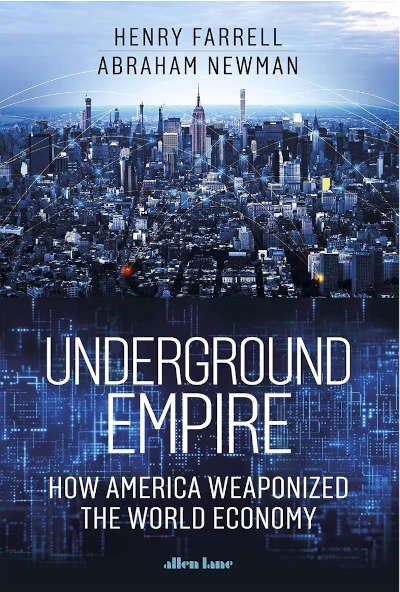In the picture
Cover of Henry Farrell and Abraham Newman's book 'Underground Empire. How America Weaponized the World Economy' (London: Allen Lane, 2023) 288 pp.
This book is not just another conspiracy theory written for conspiracy paranoids. 'Underground Empire' is an observation, rigorously written: the world's Economics has globalized on systems of circulation of data and financial transactions driven by the United States - accepted by the rest of the world because of their efficiency - and whose loose ends have allowed Washington to prolong its global influence so far this century despite the fact that its relative weight has diminished.
The communications revolution, with the great leap that the Internet has made, or the speeding up of the circulation of money transfers through SWIFT are the result of private initiative and its technological drive. The creation of these networks does not respond to a hidden purpose of the U.S. government to build a spider web that ends up trapping the world's Economics . The absence of this 'mastermind' is the clearest denial of a conspiracy devised by the White House or the CIA in collusion with Silicon Valley or Wall Street. What is happening is that in the fight against its enemies - Jihadism since 9/11, Iran's nuclear program or China's advances in semiconductors - the US government has been finding the trap doors that gave it access to the network of tunnels that extend through the subsoil of the planet and that allow it to prolong its broad dominion.
This last image is the one used by Henry Farrell and Abraham Newman, professors at two prestigious Washington university centers (SAIS and Georgetown, respectively) to give degree scroll to their book - "subway empire"- and to begin their story. The idea is completed with another image: that of the Roman Empire where all roads lead to Rome, since these interconnection networks are exposed, at one time or another, to potential control by the US government: physically, by 'tapping' the fiber optic cable through which conversations, messages and data circulate, or by imposing decisions that claim jurisdiction over transactions made in dollars by virtue of being the issuer of that currency.
The tunnels were built haphazardly as globalization spread, and the U.S. government has progressively taken the reins of that subway empire, stepping up to meet challenges as they arose. The 9/11 attacks of 2001 forced a massive effort to monitor electronic communications between suspected terrorists, which soon created a huge bureaucratic eavesdropping apparatus and encouraged overzealousness. The Issue this was reaching was unveiled with the Snowden leaks in 2013 about U.S. NSA eavesdropping activities.
But the instruments have been various and have been used by all presidents, from Bush to Biden. In addition to the security agencies, the Treasury's department has also been involved in this extended exercise of American power, excluding banks in countries under sanctions from SWIFT or preventing foreign companies from carrying out operations in dollars. Also the department of Commerce, entering into tariff wars, or the technological patent agencies to prevent Huawei from using semiconductors designed in whole or in part by US companies.
In fact, it has been the pulse with China that is highlighting the extent of Washington's effort to use Economics as a weapon. "When the United States began to confront China, the imperial struggle became apparent. The subterranean conflict moved to the surface as the old power and the new challenger battled for dominance," the authors write. With its technological advances in the digital realm and its growing economic and commercial clout, China is trying to put systems in place that not only escape U.S. control, but for its part will ultimately lead irretrievably to Beijing.
Farrell and Newman eschew a pessimistic or demagogic view of US imperialism. They defend the networks of international connections that globalization has enabled and simply appeal to the need for there to be no hidden use by any great power, but for the international community to function as a 'commonwealth' in the management of these services. The authors believe that the only way to confront an attempt by China to exercise its own imperialism is with the concerted partnership of a West where the United States is not distrusted.

